Incredible Issues: The Incredible Hulk #3 Review
This issue, nicely centered on developing an important supporting cast member, otherwise feels a bit jumbled in execution
—by Nathan on August 19, 2025—
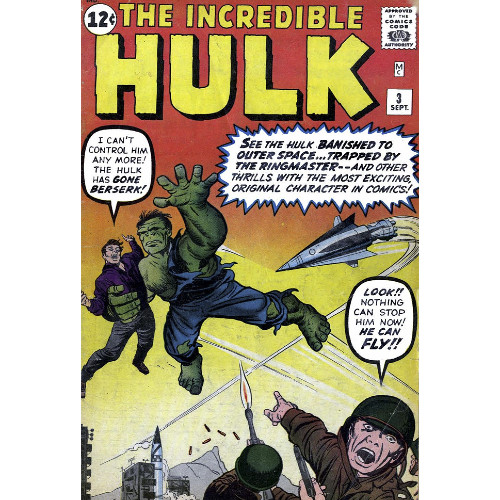
Opening this issue, you may feel some sympathy for Rick Jones.
Yeah, the poor guy brought some of his current predicament on himself–if he hadn't rushed onto a gamma bomb test site, he wouldn't have caused Bruce Banner to come out onto the field to save him, which wouldn't have caused Banner to get caught in the bomb blast, which wouldn't have caused massive amounts of radiation to transform him into the seemingly indestructible, rampaging behemoth known as the Hulk. So if you wanna trace this all back to Rick, that's a perfectly acceptable guilty thread to follow.
Rick, however, chose to stick around out of a sense of fealty to the doctor. He knows this is his fault, and he appreciates that Bruce saved his life, so the least a somewhat responsible adolescent can do is give Banner a hand when the doc transforms into a green monster every evening.
But it takes its toll, y'know, the long nights listening to the Hulk pound on his man-made prison, worrying whether the beast will break out and take his revenge on humanity. Playing nursemaid to one of the strongest creatures in the world probably wasn't how Rick thought he'd be spending his misbegotten youth. But that's where he is, and as this issue will take pains to show, he's an integral member of the Hulk's supporting cast, maybe the one guy, at this stage, who can keep the Hulk from smashing anyone and everyone around him.
"The Hulk: Banished to Outer Space"
Writer: Stan Lee
Penciler: Jack Kirby
Inkers: Dick Ayers
Colorist: Stan Goldberg
Letterers: Artie Simek
Issue: Incredible Hulk #3
Issue Publication Date: September 1962
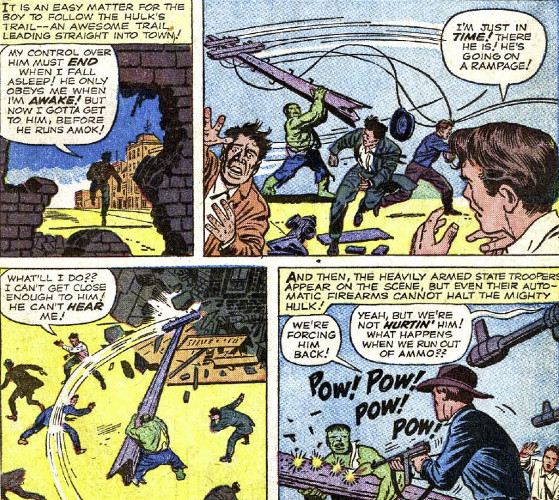
Rick, as a character, takes center stage in this issue, receiving a decent amount of characterization in the pages presented. I'd argue he's featured more heavily than the title's lumbering main star, and given that the bulk of this issue sees Rick have mental control over the Hulk's actions, his importance to the story is absolutely critical.
A bit of a shame he's kind of an idiot, though.
Take the issue's inciting incident, for example, where Rick leads the Hulk into a trap designed by General Ross and the U.S. military to blast the Hulk into space (not the last time anyone'll try that stunt!). Ross tells Rick that "America's newest, most important missile" is about to be tested but that "there isn't a man alive who could stand the force of its g-pull–except the Hulk!" And then he says one of the unintentionally funniest lines I think Stan Lee ever put on paper: "We want the Hulk to ride that rocket, in the interests of national security!"
And Rick, like an absolute moron, believes him.
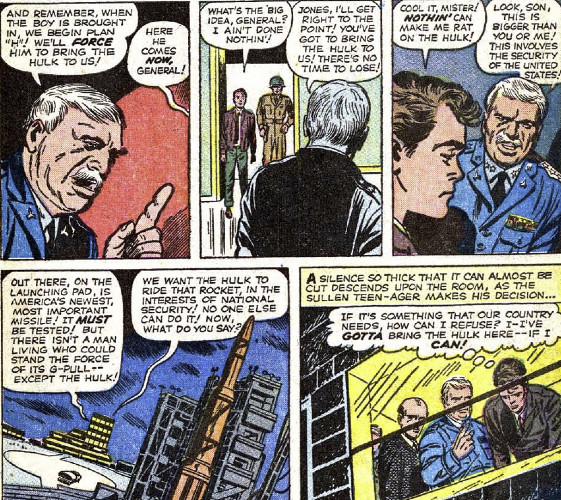
So Rick leads the Hulk to the rocket, and the rocket blasts him into space, bathes the Hulk in some cosmic radiation (maybe the same belt which gave his sometimes allies the Fantastic Four their abilities?) which changes him so he stays a big brute during the day, and results in an incident where Rick gets mental control over this Jolly Green Giant. This shapes the rest of the issue, where Rick controls the green guy as long as he stays awake.
Even for a Silver Age yarn, this feels downright wacky. I struggle to believe Rick trusts Ross' motives as easily as he does (If it's something that our country needs, how can I refuse? wonders the young man who, days before, wandered onto a government-funded gamma bomb test site on a dare), though when he realizes he's been tricked, the dude does fiddle with some instrumentation to return the Hulk to Earth. The "mind control" bit does give Rick more prominence in this issue, allowing him a measure of agency beyond following the Hulk and trying to keep him from hurting people by yelling at him. He can actually do something now with this increased control to prevent the Hulk's rampages or to at least prevent them from becoming too dangerous.
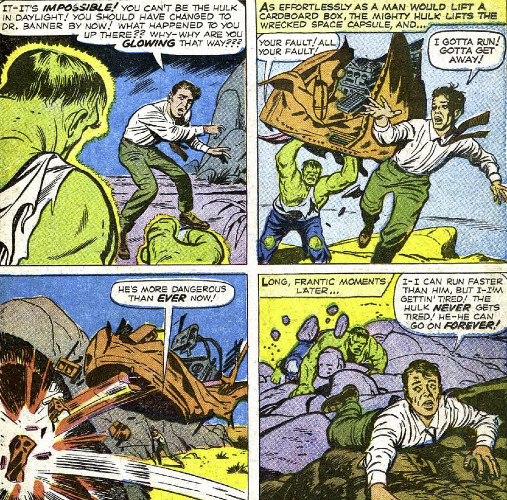
There's a greater responsibility on his shoulders now, and Lee and Kirby adequately show the toll it has on him. A few panels of Rick sitting with his back to the giant stone slab, head bowed as he tries to not fall asleep, with the Hulk pounding on the door, work well to dramatize the place where this kid has found himself. Given a second to stop by his home and wash his face, Rick is confronted by an aunt (Rick Jones has an aunt?!?) who hasn't seen him in a while, and he assures her he hasn't been around simply because he's been "too busy." He's not gonna tell her about the giant green dude he's been helping protect. We know that. The small smile Kirby knowingly gives him only adds to the drama, as we know Rick knows the secret, and the burden, he's hiding.
I should also note the Hulk does respond appropriately when he crashes back to Earth, chasing Rick and ready to rip him asunder. It's not the morally correct way for anyone to respond, but even if you weren't a walking weapon of mass destruction, you'd be absolutely justified if anyone tricked you into climbing into a rocket. Imagine someone with the Hulk's size and strength responding to being deceived in such a manner, and you can understand why the Hulk behaves the way he does. His actions enforce the theme Lee and Kirby have already woven into the past two issues, that the Hulk is not a hero. He's a monster, with a limited intellect, driven by immediate responses and reacting to circumstances without thought for others. If he can't vent his rage against the whole of humanity, he may as well try and crush the little guy who made him look a fool. Rick's control brings a semblance of guidance to the beast, but only when Rick's awake to give him instructions.
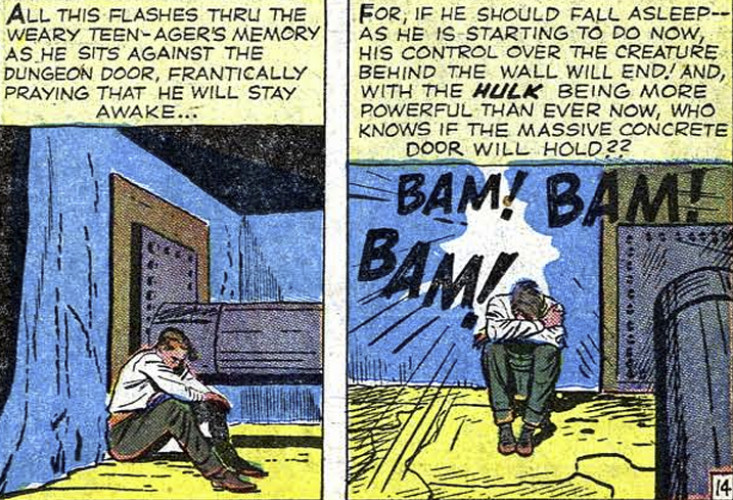
Lee and Kirby endeavor to expand on the "mind control" bit by giving the issue's villains, the Ringmaster and the Circus of Crime, a similar shtick. With his hypnotic top hat, the Ringmaster has been putting towns under his thrall for his crew to rob blind. Parallels aren't really made between the Ringmaster's coercion and Rick's own control over the Hulk–nobody compares, for example, how Rick is at least trying to exert a controlling influence over the Hulk to prevent disaster while the Ringmaster is using his top hat to exploit people. But it makes for a fun gimmick, and a battle under the big top lets Kirby create clever ways for the Hulk to fight carnies. I tend to associate the Circus of Crime with Spider-Man, so it's fun to see their roots go back to the Green-Skinned Goliath.
Also of note is the apparent new leaping ability given the Hulk, reinforced by Kirby's art and Lee's dialogue. In some panels, Kirby draws the Hulk in the air as if he's flying, including two panels where he takes very noticeable turns mid-air. Lee has Rick call this out, though narration attributes the motion to a "leap the like of which has never before been seen by mortal man" which is "propelled by the most powerful muscles of any living thing on Earth!" One could argue Rick believes the leap is so high and far it merely feels like flying, though Kirby's later art has the distinct motion of the Hulk maneuvering while in air. So is he leaping…or is he flying? This issue doesn't answer that question.
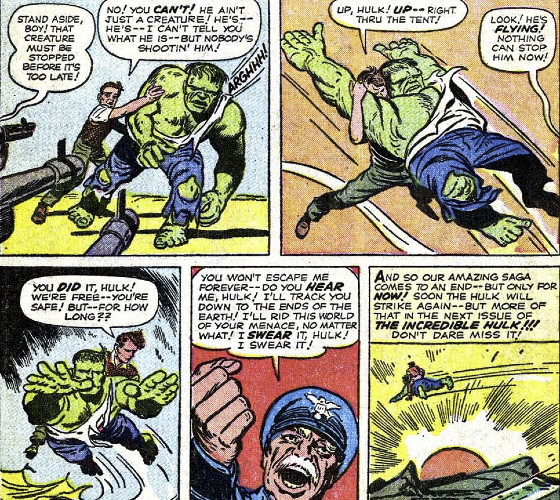
You do get a sense that Kirby and Lee, while maybe not completely at odds with their take on the Hulk, aren't fully cognizant of the direction they want to take the character or at least in perfect harmony about what to do with the guy. What the heck is this shambling monstrosity? He's no hero, though he battles the Circus of Crime. He's so much of a threat to society he's locked up at night and requires a young man's newly acquired mental control to keep him from demolishing whatever gets in his path. A two-page recap of the Hulk's origin feels unnecessary in the series' third issue and smacks of the creative team looking for filler material, to bide their time before the dramatic confrontation with the Circus of Crime. They seem unsure of the kind of story they wish to tell.
Unlike the Hulk's very deliberate method of locomotion, this issue feels aimless in its direction. The focus on Rick is welcome and adds more to his character through these new abilities, the revelation of a family member, and the well-wrought burden he feels while babysitting Banner's behemoth bad side. Of course, his aloofness may damage a bit of that perspective for the reader as it did for me, and I can't say I'm terribly fond of a Hulk that flies. Jumping is one thing and is a clever method of movement, but the idea of a creature that size flying is far sillier than terrifying. It's an idea that got canned quickly, and I think the Hulk is all the better for it. But I guess, three issues in, this kind of thing is to be expected: Lee and Kirby tossing up ideas, seeing what flies, seeing what falls, and I'm glad they eventually went with a Hulk much more constrained by the laws of gravity.